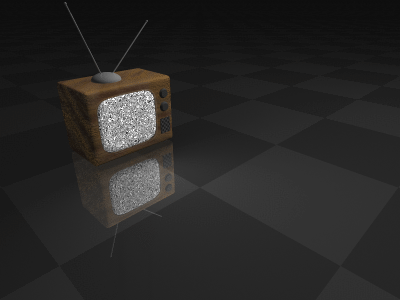Media alt text:
3D render of old tv set with animated static on its screen, as if tuned to a dead channel.
If you put a TV in a Faraday cage that blocked the relevant radio spectrum, would there be no static on it? I expected the answer to be a quick Google, but it wasn’t.
That is a good question, but I suspect if you tried this in real life it would still show static.
- The waves are amplified with a circuit that attempts to find a signal even if it’s very weak (so you can get a picture even if you’re close or very far from the tv station)
- At a certain point, the electromagnetic field from the running TV itself would start to get picked up
I suspect a better thought experiment would be if you just disconnected the input and amplification circuit entirely from the CRT tube, in which case you would probably just get white as the electron beam scans back and forth without any modulation.
Let me turn that around:
Would a TV still show static if you disconnected the input and amplification circuit outside a Faraday cage?
Input yes, amplification no
“The sky above the port was the color of television, tuned to a dead channel.” W. Gibson.
It’s wild that this makes no, or little at most, sense to entire generations now.
What do you mean? It’s blue, right?
(It’s a joke. Don’t worry, I get the original meaning, I’m old.)
In another bit of poorly-aged prediction by Gibson, Case, the main character, brings some RAM with him to sell for a quick buck on the street. How much RAM? Three entire megabytes.
Yeah, but tbf, Case was pretty jacked up at the time.
Also, there’s a market now for obsolete stuff.

Here’s the real question: did Gibson write Neuromancer before or after Bill Gates said no one would ever conceivably need more than 640k of RAM?
I’m not sure, but I always found it mildly amusing that he wrote it on a manual typewriter.
The TV will try and amplify and display any signal. Without a station, it will end up amplifying random radio noise and tiny fluctuations in the amplifier circuits themselves.
The momentary signal strength is interpreted as brightness of a spot which is rapidly scanned over the display. In this case the signal is random so every spot on the screen will be a random brightness, changing every frame.
Modern digital TVs won’t do this, because with compressed video recognizable data is needed to even attempt displaying a picture.
As for the sources of the radio noise, most of it is from electrons being jostled by heat, some from space. (Including the cosmic microwave background others have mentioned)
The electron jostling (thermal noise) is the reason the receivers on radio telescope as cooled to insanely low temperatures often with liquid helium.
The cosmic microwave background?
Or any other waves around you
By tv static, I mean like this btw:

Cosmic microwave background. You are seeing the big bang.
Cosmic microwave background radiation - the remnants of the big bang.
https://en.m.wikipedia.org/wiki/Noise_(video)
There are many sources of electromagnetic noise which cause the characteristic display patterns of static. Atmospheric sources of noise are the most ubiquitous, and include electromagnetic signals prompted by cosmic microwave background radiation,[1] or more localized radio wave noise from nearby electronic devices.[2]
The display device itself is also a source of noise, due in part to thermal noise produced by the inner electronics. Most of this noise comes from the first transistor the antenna is attached to.[2]
I remember putting my finger near the CRT display of these televisions during the animated static and noticing the weird electrical tingle in my finger. I even did this with my hair. It was so fun… and also potentially dangerous.
Now that’s something I can’t replicate anymore with my modern telly.
i approve of British people and their television channels
I’m glad I had access to those despite living in Morocco
John Wayne in a Blizzard. So said my dad.






